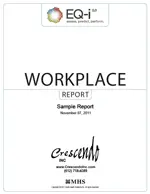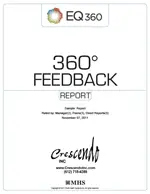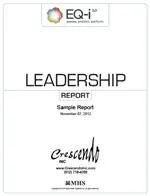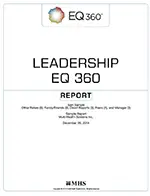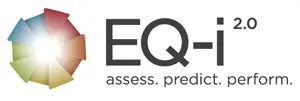
Crescendo Inc. chose to work with the original EQ-i® (authored by Dr. Reuven Bar-On) assessment because it was the first validated assessment to measure social and emotional intelligence. Additionally, we found it to be a very versatile assessment tool which has allowed us to use it with leaders at all levels in organizations of different types (large, small, public and private.)
EQ-i2.0, published by MHS (Multi-Health Systems), builds on the original Bar-On Model. It reflects the dramatic shifts in cultural diversity, changing attitudes and value systems in North America that have occurred since the original EQ-i® release in 1997
Emotional Intelligence Defined
MHS (Multi-Health Systems) defines Emotional Intelligence (EI) as…
a set of emotional and social skills that influence the way we perceive and express ourselves, develop and maintain social relationships, cope with challenges and use emotional information in an effective and meaningful way.
Facts about the EQ-i 2.0
- Revised based on the original model by Dr. Reuven Bar-On, 1997
- It is considered reliable and valid based on numerous statistical analyses.
- The EQ-i 2.0 has been validated across age, gender & ethnicity.
- The North American norm group includes 4,000 self-reported ratings from adults residing in the U.S. and Canada. Data were gathered from all 50 U.S. states and the District of Columbia, as well as from all 10 Canadian Provinces.
- Race/ethnicity, education level and geographic region distributions are all within 4% of Census targets. This close match to the census means that EQ-i 2.0 is highly representative of the North American general population, thereby meeting the highest scientific standards for norm sample development.
- More than 1 million people have been tested worldwide.
EQ360 Assessment

The EQ360 is the companion assessment that measures the same emotional and social competencies as the EQ-i2.0 self-report, but from the perspective of those who work with the individual being assessed. The two assessments (EQ-i2.0 and EQ360) work together to provide a more complete view of an individual’s strengths and limitations, with the goal of helping organizations maximize their workforce potential.
Emotional Intelligence (EI) Practitioners use these tools in a variety of ways including recruitment, development, coaching, training, team-building and conflict resolution. Users of EQ-i2.0 can be confident that the scores generated by these assessments will be consistent and reliable. Decades of research prove the effectiveness of the EQ-i in measuring emotional intelligence, related concepts and relevant outcomes.
EQ-i2.0 Sample Reports
Next: EQ-i2.0 Model & Measures

